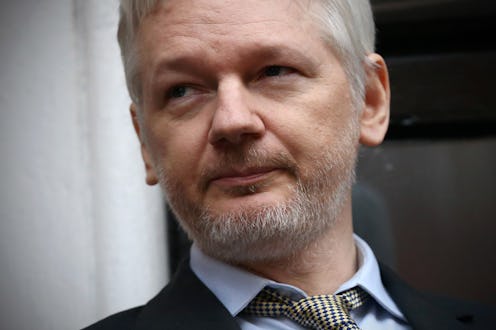News
Assange Defends WikiLeaks Against Bias Claims
Right around the time of the Democratic National Convention, the self-proclaimed whistleblower site WikiLeaks published thousands of emails between Democratic National Committee officials, some of which suggested bias against Sen. Bernie Sanders. Then, just ahead of Election Day, thousands more emails were released, some containing excerpts from Clinton's Wall Street speeches and others which suggesting that Clinton may have received advance notice about a primary debate question, among other things. WikiLeaks and its head, Julian Assange, have faced criticisms of bias against Clinton. In an Election Day statement on WikiLeaks, Assange defended himself and the site against such criticisms.
Some in the Clinton campaign has claimed that WikiLeaks is effectively "Russian front," as The Daily Beast characterized the campaign's attack. Though there is evidence some emails were shared with WikiLeaks by Russian hackers, it hasn't been definitively proven that there was any cooperation between the site and the Russian government, and there is no evidence that any emails were faked or tampered with, either. “For Russia, WikiLeaks is more like a useful idiot because they [WikiLeaks] are too cowardly and dumb to be in on the master plan,” a U.S. intel official who asked to remain anonymous told The Daily Beast. Assange has denied that Russia was behind the leak of emails from the Clinton campaign chairman, John Podesta.
It's true that WikiLeaks hasn't been publishing leaked documents about other presidential candidates. But Assange defended the site against any bias in its choice to release the documents surrounding Clinton. "To date, we have not received information on Donald Trump’s campaign, or Jill Stein’s campaign, or Gary Johnson’s campaign or any of the other candidates that fufills [sic] our stated editorial criteria," Assange wrote. A document fits the criteria "if it is of political, diplomatic, historical or ethical importance and...has not been published elsewhere," he explained.
Assange asserted that WikiLeaks is in no way motivated by political preference, but by transparency alone, while expressing antipathy toward both major-party candidates. "This is not due to a personal desire to influence the outcome of the election. The Democratic and Republican candidates have both expressed hostility towards whistleblowers." He acknowledged that he spoke at a campaign launch event for the Green Party's candidate, Stein, whose platform includes whistleblower protections. But he claimed that this in no way influenced what documents the site publishes.
Assange went one step further than defending the site against bias in its choice of what documents to publish, claiming it would have been biased not to publish them. "Publishing is what we do," he wrote. "To withhold the publication of such information until after the election would have been to favour one of the candidates above the public’s right to know."
Assange said that, since the site has helped served the public's right to information, "irrespective of the outcome of the 2016 US Presidential election, the real victor is the US public which is better informed as a result of our work." His defense against the criticism of bias is that the site can only publish the information it has, and that the public is better off with as much information as it can access, regardless whose political success it may help or hurt.
Whether Clinton's campaign or the American public agrees with Assange's defense, remains to be seen.
